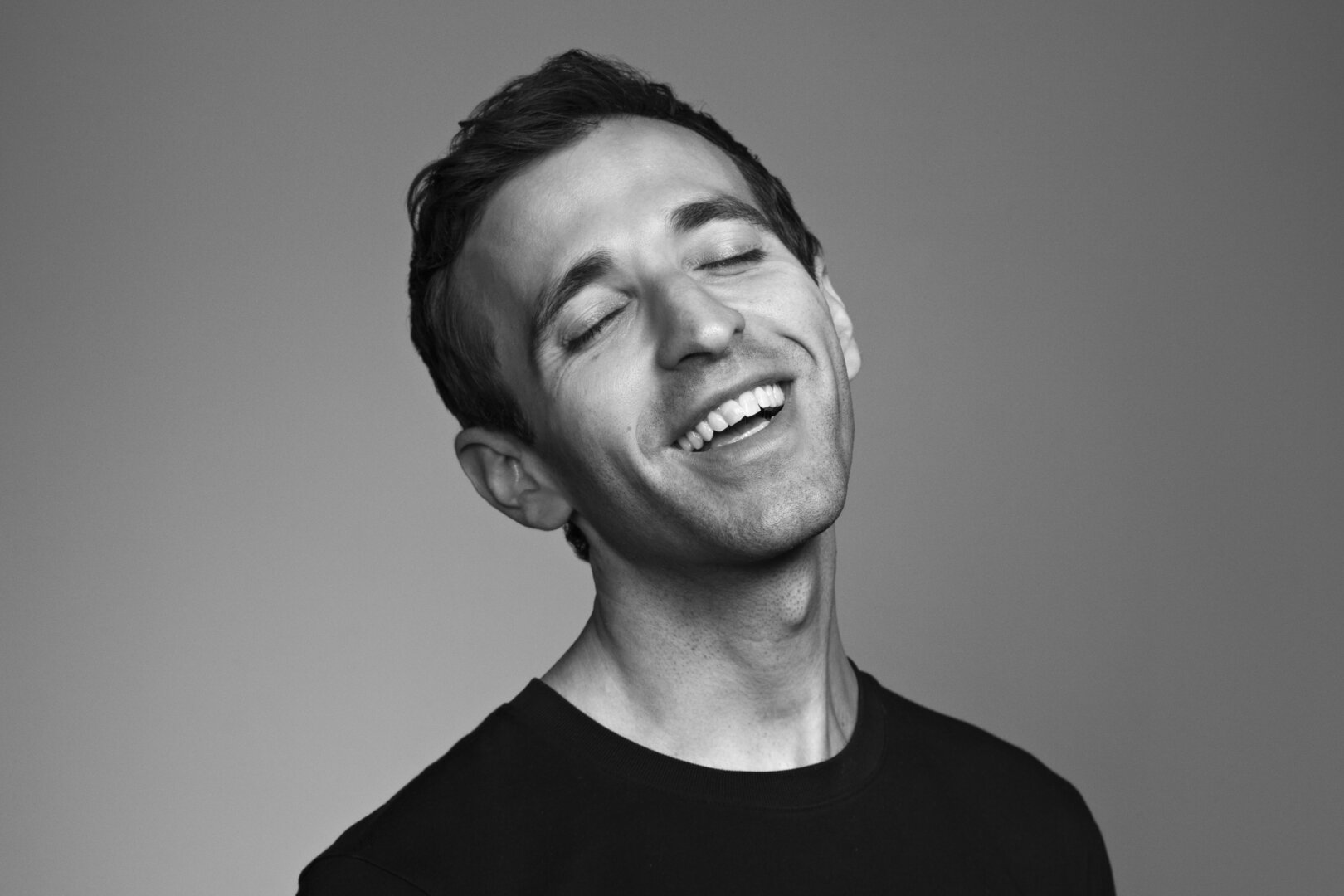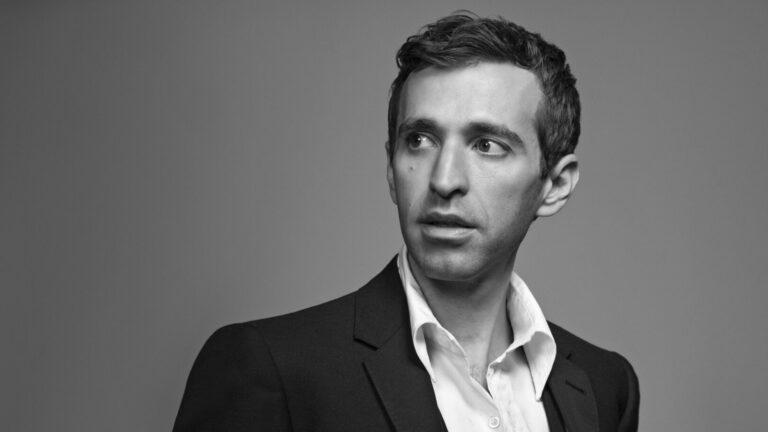As a child, Anthony Roth Costanzo performed in Broadway musicals, and once sang backup for Michael Jackson; as a countertenor, however, he has long been the centre of attention. He speaks with enthusiasm about the contemporary opera that changed his life, Japanese kabuki theatre, and the filmmaker he regards as his mentor. He also touches on the operation that might easily have ended his singing career, and a Hungarian-speaking great-grandmother who taught him her recipe for paprika chicken. We spoke with the world-renowned countertenor giving his Budapest concert on 7 April by phone from New York.
– Can I assume that it’s unusual for an opera singer to start their career in Broadway musicals?
– Absolutely. But I like to think of opera as theatre, and so it was a wonderful way to get really grounded in theatre and focus on dramatic expression, which I think is at the core of vocal music, and opera in particular.
– You last sang in a musical when you were eleven. Was it a smooth transition into the world of opera?
– I did Broadway for two or three years, and then someone asked me to sing in Benjamin Britten’s opera, The Turn of the Screw. I was captivated by the world of opera. I started as a boy soprano, but my voice began to change. At the time I had no idea what a countertenor was, but things changed quickly.
– Was it during this time that you were a backup singer for Michael Jackson?
– When I was about twelve, I got asked to sing backup for one of his songs. It was fascinating to observe him doing his work. It was just one song we sang, and I don’t even remember what it was because we had to sign a non-disclosure agreement. But I have the CD he signed for me, so I know it really happened.
– Probably the biggest obstacle you faced as a singer was your surgery more than ten years ago. Did you have a concrete plan B in case something went wrong?
– It’s hard to know, but when you have thyroid cancer, the thyroid is on top of all your vocal nerves and they have to take it out to get rid of the cancer. It’s sort of like taking chewing gum out of hair: if they cut anything underneath the thyroid as they’re taking it out, it can affect the way you sing or speak because those nerves control all the functions. But that made me really think about what was important to me in making art and in singing, and that’s communication. I know that there are so many different ways to communicate and facilitate art that go beyond singing. My work as an artist goes far beyond just singing and performing; it’s about how I can engage audiences and reinvent the art form. I was only 25 or 26, so I don’t think I had a concrete plan B, but I’ve always been involved in producing things, in creating things, and I knew that creativity would always be there even if I couldn’t sing in the same way.

– Both your parents were psychologists. Was there any pressure to follow in their footsteps?
– There was no pressure whatsoever, they were incredibly supportive. But they did instil one thing, which is they wanted me to study the entire world, not just music, not just the focus of a conservatory. So I went to Princeton University, where I was exposed to lots of different kinds of academic engagement, and I think that served me really well. Everything from ethics to philosophy to computer science… then of course history and literature and gender studies: all the different things that have played a role in what I’ve been able to create.
– During your years at Princeton University you wrote a show about a fictional castrato. How did this come about?
– I did a show that took the lost and forgotten music of the castrati and wove it together with spoken dialogue and dance. It was thrilling to combine different disciplines, to take this forgotten music and create a new form, and do it with an academic underpinning. Subsequently we made a documentary about that which went to the Cannes Film Festival and played on our arts channel PBS here in the United States.
– What’s your fascination with the world of the castrati? Is it a tragic world for you, or just a world to explore historically?
– It’s the foundation of everything I sing. I’m fascinated with the fact that opera—all of opera—was born of the castrati, these castrated male singers. To understand what their life was and how they fit into society gives you a whole perspective on the history of music, on expression, on this idea of art being a part of the body. They were kind of the rock stars of their era: as well as the sadness and the pain they experienced, some of them became huge stars. And we see the shadows of those stars in our pop stars today; whether it’s Prince or Michael Jackson, or Justin Timberlake and Justin Bieber, who use a high falsetto to sing.
– So whose music is closer to you, Justin Timberlake’s or Justin Bieber’s?
– I don’t know that I’m particularly close to either of them, but I think we share a vocal approach and a falsetto tone every now and then! If I had to pick a Justin, it’d be my current collaborator Justin Vivian Bond, who’s an incredible cabaret and transgender performer.
– You appeared in a Japanese kabuki theatre production in Kyoto. Is it easy to fit into these different genres, these different worlds of performing?
– I don’t think it was easy, and I’m not after easy, I’m after interesting. And so it was fascinating to work together, and it was one of the most revelatory experiences of my career: to see how their classical art form functioned, how they made it, how it interacted with their audiences, and think about that in comparison to our Western opera, and the fact that it began at about the same time kabuki did.
– So what can you tell us about the cabaret performance you did recently?
– I have a new album that just came out [Only an Octave Apart, with Justin Vivian Bond], and out of that album we made a show. It looked at all different kinds of things like gender and sexuality through the lens of music. I had so much fun exploring the exhilaration that comes from other kinds of music, whether it’s jazz or pop or cabaret, and finding the connections with classical music. And I think it’s engaged a different and younger audience, but it’s also reinforced the beauty and excitement we can have about classical music.
– You’re associated with quite extravagant performances. One in particular was the Philip Glass opera Akhnaten, where you appeared naked. Another was The Double Life of Zefirino, where you wore this extravagant costume designed by the Oscar-winning film director James Ivory.
– Both have been a big part of my history. James Ivory taught me about art, light, cinema, dance, all kinds of things, and has become a big mentor of mine. I appeared in his film A Soldier’s Daughter Never Cries, and I learned a tremendous amount about acting that I still use in opera. Akhnaten changed the trajectory of my life, because it was such a success but it was also such an artistic and fulfilling experience.
– You have a special training method as an opera singer using mental images. What images will you conjure in preparing for your concert in Budapest?
– There are all kinds of mental images that I’ve cultivated over the years for my vocal technique. So you might think of a flower opening on a high note in order to give it a kind of sonic bloom. But, that said, I like to respond to the sounds of the orchestra and the feeling of the place. I’ve never been to Hungary, and I’m really excited to come for the first time as my mother’s family came from Hungary to the United States. My great-grandmother, who I met, spoke Hungarian, and she passed on one of her recipes for chicken paprikás to me.
The interview first appeared in the 2022 edition of the Bartók Spring Magazine.
Antony Roth Costanzo
Turning 40 this year, the American countertenor and producer Anthony Roth Costanzo began his career as a child performer in musicals on New York’s Broadway. He graduated in 2004 with a degree in music magna cum laude and Phi Beta Kappa from Princeton University, where he has since been invited to teach regularly. As an opera singer he is a returning guest of the world’s leading opera companies – among others the Metropolitan Opera, the English National Opera and Glyndebourne Festival Opera. He has given memorable performances in the roles of Apollo (in Britten’s Death in Venice), the Angel (in Kaija Saariaho’s Only the Sound Remains), Akhnaten (in the Philip Glass opera of the same name) and Prince Go-Go (in Ligeti’s Le Grand Macabre). In 2019, he was named Vocalist of the Year by Musical America, while his solo album of works by Philip Glass and Handel was nominated for a Grammy Award.











